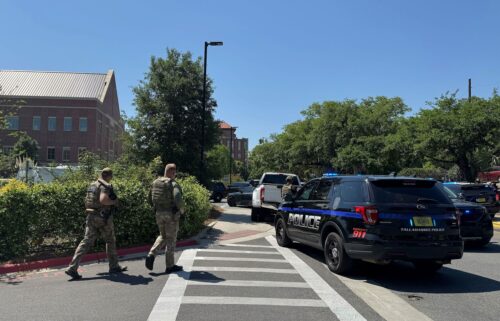Cornell student: Antisemitic threats have no place at my school
CNN
Opinion by Gabriel Levin
(CNN) — An arrest has been made after evil posts online called for the eradication of Jews at Cornell, the university I attend. But I feel no sense of closure. Even though the suspect, a fellow student, is in federal custody, the constant threat of anti-Semitism looms over us still.
I learned growing up in a staunchly conservative suburb of Orange County, California, that being Jewish is not for the faint of heart. As a kid in school, classmates threw antisemitic tropes at me more times than I can count.
A week before my high school graduation, one student scrawled swastikas on his hands in ink and flashed them at me. For the antisemites among my peers, I wasn’t Gabriel, which is Hebrew in origin for “strength in God.” I was simply a dirty Jew, a penny-pincher — and other epithets that are much, much worse.
I applied to Cornell University, where I’m now in my sophomore year, in part to get away from all that. With all its talk about inclusion, I thought that Cornell would be the perfect place to celebrate my peers’ diverse backgrounds and share my own. After all, 22% of students at Cornell are Jewish, according to official enrollment figures. But now I know that there is no corner of the globe where Jews are safe from intimidation.
On Sunday, when a series of anonymous threats against Jews were published on an online discussion forum about Cornell, I was so shaken that I wept. What I read was more disgusting than the vilest insults that had ever been hurled my way before.
The posts, allegedly written by a junior at Cornell, praised Hamas, vowed to turn our synagogues into graveyards and threatened to slaughter any and every Jew on campus. By Sunday evening, university police officers stood guard at Cornell’s Center for Jewish Living, a residence hall that has a kosher cafeteria. Jewish Cornellians were unsure of whether the next time they left their dorms would be their last.
The Center for Jewish Living is a home away from home for many Jews at Cornell, where outreach ranges from Shabbat dinners to high holiday celebrations. One of the reasons that Jews come to Cornell is because, unlike a number of other colleges nationwide, it has a space like this one, a haven where each one of us can go to feel a sense of belonging. To have that threatened at a moment in American history when the flames of anti-Jewish hatred are burning as bright as ever cuts to the heart of my community.
Jews at Cornell are politically, ritually and geographically diverse. But today, we are bound together by a shared concern both for our safety and for the civil exchange of ideas that makes a university a place where students can learn about one another. Tolerance is the only way to heal from this. Peacemakers, students who are able to look beyond their differences to find shared humanity, will not be bullied into silence.
Nobody should have to live in fear for practicing their faith. As the horrifying death toll in Gaza spirals in the aftermath of Hamas’ brutal terrorist assault on Israel, the antisemites and Islamophobes of the world are feeling empowered.
A six-year-old Palestinian-American boy was recently stabbed to death in his Illinois home by his family’s 71-year old White landlord, according to the local sheriff’s office. The man, who pleaded not guilty during a court appearance last week, allegedly was angered by the Israel-Hamas war. Already, reports of anti-Jewish and anti-Muslim hate crimes have soared in major cities from Los Angeles to New York. The Israel Defense Forces meanwhile are continuing their assault on targets in Gaza, and the world can’t look away.
But many have taken their outrage too far. Some student activists and professors at elite colleges across the nation have attempted to rationalize the massacre of innocent Israelis as an inevitable response to unjust policies.
Just two weeks ago, an esteemed history professor at Cornell, Russell Rickford, told a crowd of demonstrators that he was initially “exhilarated” when Hamas rampaged through Jewish villages. Rickford’s remarks were met with scattered applause. Only after intense pressure did he apologize, condemning all violence against civilians. We now know that Hamas gunmen butchered everyone from infants to the elderly with callous indifference, murdering 1,400 people in total.
Jews need to feel safe in academic spaces, too. Antisemitic stereotypes and the glorification of brutality have no place in colleges. If Jews are endangered, so too is civic democracy. Everyone needs to take a stand. The loudest voices may try to drown out meaningful dialogue, but it’s the job of good-faith Jewish and Arab students to keep each other in mind, to forge a path forward for reconciliation and to never give into prejudice.
We are all God’s children. Religion should bring us together, not tear us apart. I pray for the people of Gaza whose futures hang in the balance and for the Israeli hostages who just want to see their families again.
My classmate who allegedly made those heinous threats against Jews wanted us to cower in fear, or worse, return hate for hate. We will do neither. Among the highest aspirations of all the major religions is compassion. Tikkun olam, or “heal the world,” is the ideal Jews are supposed to live by. I’ll keep acting on that ancient Hebrew rule, and one day it might just come true.
The-CNN-Wire
™ & © 2023 Cable News Network, Inc., a Warner Bros. Discovery Company. All rights reserved.



